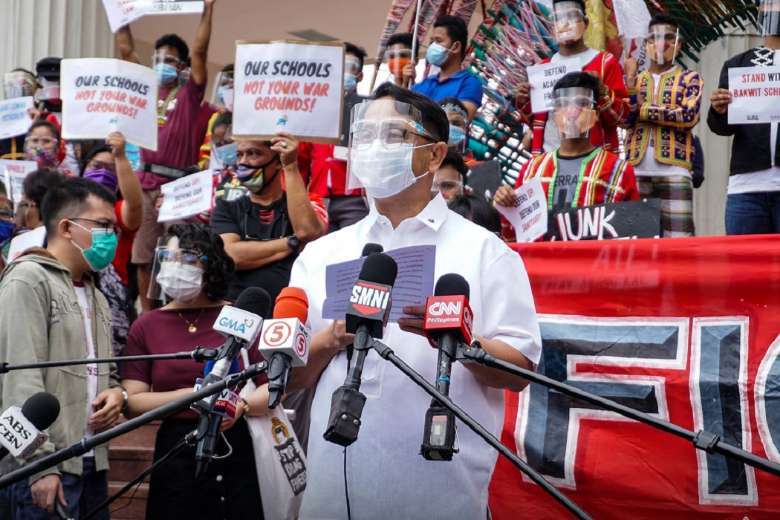
MANILA (Agencies): The Philippine government has come under fire for unilaterally abrogating the 1989 University of the Philippines (UP)-Department of National Defense accord, which restricted military and police access and operations inside the university, requiring them to seek permission first before entering campuses.
Administrators and students condemned the Defense Department’s move, seen as an attempt to enable security forces to enter campuses freely to intimidate and make arrests, with UP president, Danilo Conception, calling the termination of the agreement by Defense secretary, Delfin Lorenzana, “totally unwarranted.” Students staged protests on January 19, UCAN reported.
He said, “I must express our grave concern over this abrogation as it is totally unnecessary and unwarranted and may result in worsening rather than improving relations between our institutions, and detract from our common desire for peace, justice and freedom in our society.”

Photo: UCAN/courtesy of Sophia Sibal of the Philippine Collegian
In a letter to the UP president, Lorenzana said, “The department finds this agreement a hindrance to providing effective security, safety and welfare for the students, faculties and employees of the UP.” He also claimed that the outlawed Communist Party of the Philippines was secretly recruiting on university campuses.
The university has been critical of extrajudicial killings and of the controversial anti-terrorism law of the president, Rodrigo Duterte, which critics say gives the government more oppressive powers.
Lorenzana maintained that security forces did not intend to build police or military posts on the university’s campuses to suppress academic freedom and free speech, UCAN reported on January 20.
Conception pointed out that the 1989 agreement “was grounded in an atmosphere of mutual respect, which we were able to maintain for 30 years through the observance of good faith in its provisions. The agreement never stood in the way of police and security forces conducting lawful operations on our campuses. Entry was always given when necessary to law enforcers within their mandate.”
He told Lorenzana, “We regret that the agreement was abrogated unilaterally without prior consultation that would have addressed the concerns you raised in your letter. Instead of instilling confidence in our police and military, your decision can only sow more confusion and mistrust, given that you have not specified what it is that you exactly aim to do or put in place in lieu of the protections and courtesies afforded by the agreement.”
UCAN reported that Christian group, Kalipunan ng Kristiyanong Kabataan (Congregation of Christian Youth), said in a statement: “(This) presages state intrusion into the Philippine academe, in general. Uninhibited entry of state forces into school grounds … encroaches on our academic freedom.”
As we celebrate the 500 years of Christianity in the Philippines. The Chaplaincy to Filipino Migrants organises an on-line talk every Tuesday at 9.00pm. You can join us at:
https://www.Facebook.com/CFM-Gifted-to-give-101039001847033
Philippine vice president, Leni Robredo, along with several senators expressed dismay at the Duterte administration’s unilateral nullification of the 1989 accord, CNN Philippines reported on January 19, with Robredo saying that administration’s move was meant to silence government critics. The vice president pointed out that the accord merely asks law enforcers to give notice before conducting any security operations inside campuses.
“This is neither a difficult nor onerous rule… Clearly, then, this is not a practical gesture, but a symbolic one. One designed to sow fear. One designed to discourage dissent. One designed to silence criticism,” Robredo said.
CNN Philippines reported that Francis Pangilinan, a senator and former UP Diliman University Student Council chairperson, emphasised the historical significance of the accord posting on Twitter: “UP has always been and will always be a citadel of freedom and democracy. Please don’t mess with UP.”
The Inquirer reported on January 21 that four senators: Joel Villanueva, Sonny Angara, Nancy Binay and Grace Poe, filed a bill that would make the ban on the presence of soldiers and policemen on University of the Philippines (UP) campuses a state policy.
They disputed the Defense secretary’s claim that the university had become a recruitment hotbed saying, “There is no monopoly of ideology in UP. It remains a big tent that shelters all ideas that can be pursued nonviolently. It is not a rebel recruitment station. On the contrary, it hosts many DDS (Diehard Duterte Supporters) who are free to compete in the marketplace of ideas.”
The Inquirer reported them as saying that the state university “remains a citadel of excellence where the skills to serve the people are taught. This academic brilliance can only shine under a climate of freedom.”
On January 21, the Nagkaisa Labour Coalition waded into the conflict, UCAN reported.
“Workplaces are also off limits to the military and police. It is on this principle of freedom that workers stand with UP as we believe that schools and workplaces are not soldiers’ battlefields,” Sonny Matula, the coalition’s chairperson, said.
He also pointed out that scrapping the agreement posed a threat to labour groups who hold regular meetings on the university’s campuses.
Divine Word Father Flavie Villanueva accused the government of bullying.
“If you (Duterte) cannot protect our seas, you have no business bullying an institution that stands against tyrants and despots,” he said, referring to the South China Sea dispute with China.
Established in 1908, the University of the Philippines has built a reputation of academic excellence as well as for dissent against rights abuses.








